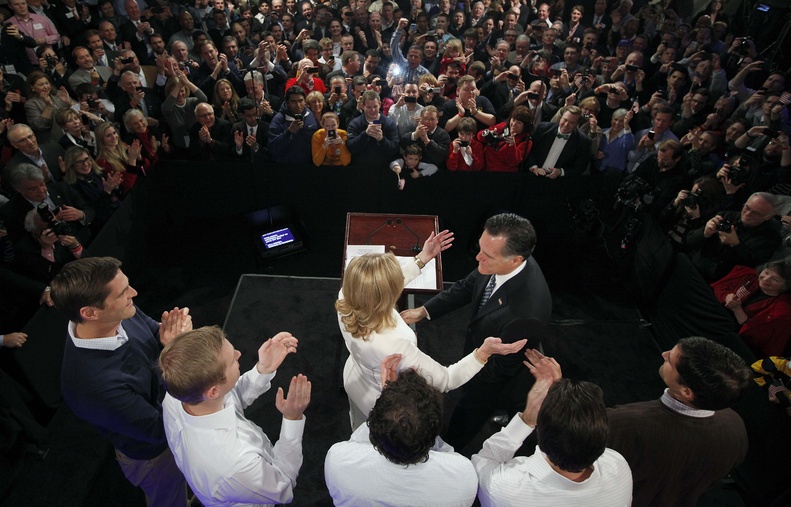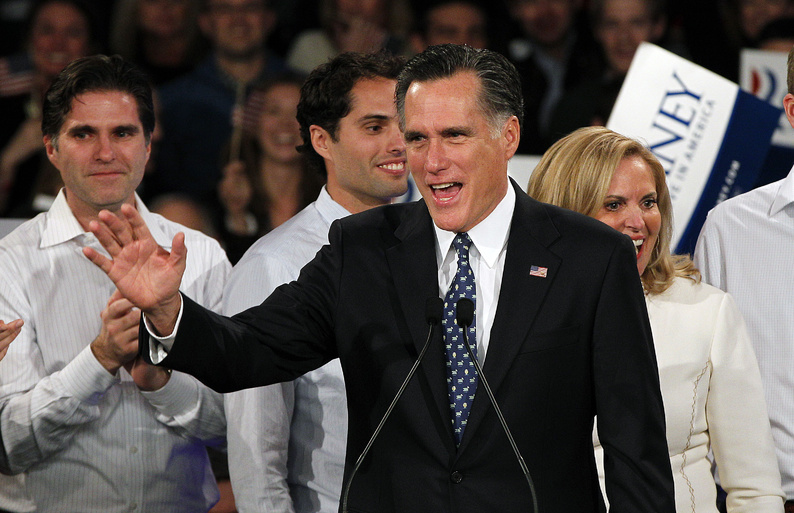CONCORD, N.H. – Mitt Romney cruised to a solid victory in the New Hampshire primary Tuesday night, picking up steam from his first-place finish in the lead-off Iowa caucuses and firmly establishing himself as the man to beat for the Republican presidential nomination.
“Tonight we made history,” Romney told cheering supporters before pivoting to a stinging denunciation of President Obama. “The middle class has been crushed … our debt is too high and our opportunities too few,” he declared – ignoring the rivals who had been assailing him for weeks and making clear he intends to be viewed as the party’s nominee in waiting after only two contests.
His Republican rivals said otherwise, looking ahead to South Carolina on Jan. 21 as the place to stop the former Massachusetts governor. Already, several contenders and committees supporting them had put down heavy money to reserve time for television advertising there.
Even so, the order of finish – Ron Paul second, followed by Jon Huntsman, with Newt Gingrich and Rick Santorum trailing – scrambled the field and prolonged the increasingly desperate competition to emerge as the true conservative rival to Romney.
With his victory, Romney became the first Republican to sweep the first two contests in competitive races since Iowa gained the lead-off spot in presidential campaigns in 1976. Based on partial returns, The Associated Press estimated that turnout would exceed the 2008 record by about 4 percent.
Romney fashioned his victory despite a sustained assault by rivals eager to undermine his claim as the contender best situated to beat Obama and help reduce the nation’s painfully high unemployment. Gingrich led the way, suggesting at one point that Romney, a venture capitalist, was a corporate raider. The front-runner’s defenders said the rhetoric was more suitable to a Democratic opponent than a conservative Republican one.
Returns from 69 percent of New Hampshire precincts showed Romney with 38 percent of the vote, followed by Texas Rep. Paul with 24 percent, Huntsman, the former Utah governor, with 17 percent and former House Speaker Gingrich and former Pennsylvania Sen. Santorum with 10 percent each.
In interviews as they left their polling places, New Hampshire voters said the economy was the issue that mattered most to them, and a candidate’s ability to defeat Obama outranked other qualities.
Romney had won in Iowa by a scant eight votes over Santorum, and gained barely a quarter of the vote there.
On Tuesday, he battled not only his rivals but also high expectations as the ballots were counted, particularly since his pursuers had virtually conceded New Hampshire, next door to the state Romney governed for four years.
Seeking to undercut Romney’s victory, Gingrich and others suggested in advance that anything below 40 percent or so would indicate weakness by the nomination front-runner.
They didn’t mention that Sen. John McCain’s winning percentage in the 2008 primary was 37 percent.
Romney’s win was worth at least four delegates to the Republican National Convention next summer. Paul earned at least two delegates and Huntsman at least one. Another four remained to be awarded, based on final vote totals.
“Tonight we celebrate,” Romney told his supporters Tuesday. “Tomorrow we go back to work.”
Unlike Iowa and New Hampshire, where unemployment is well below the national average, joblessness is far higher in South Carolina. That creates a different political environment for the race.
The state also has a reputation for primaries turning nasty, and it appeared that all of Romney’s pursuers read the New Hampshire returns as reason enough to remain in the race.
Texas Gov. Rick Perry, who skipped New Hampshire to get a head start in South Carolina, said Tuesday’s results showed that “the race for a conservative alternative to Mitt Romney remains wide open.”
“We’re nibbling at his heels,” Paul said of Romney.
Huntsman had staked his candidacy on a strong showing in New Hampshire, and he announced after the polls closed that he had passed his own test. “Where we stand is a solid position, and we go South from here,” he said.
Despite struggling to gain 10 percent in New Hampshire, Gingrich and Santorum also said they were in.
About one-third of Republican voters interviewed as they left their polling places said the most important factor in choosing a candidate was finding someone who could defeat Obama in the fall. Romney won their support overwhelmingly.
He ran about even with Huntsman among the one-quarter of the voters who cited experience as the most important factor in selecting a candidate to support.
Paul ran first among voters who cited moral character or true conservatism as their top criteria.
The survey results came from interviews conducted for The Associated Press and the television networks with 2,670 voters across the state. It had a margin of sampling error of plus or minus 3 percentage points.
New Hampshire has a rich history of humbling favorites, front-runners and even an occasional incumbent.
The state’s Republican voters embarrassed President George H.W. Bush in 1992, when he won but was held to 53 percent of the vote against Pat Buchanan, running as an insurgent in difficult economic times. Buchanan, who never held public office, won the primary four years later over Sen. Bob Dole of Kansas, who was the nominee in the fall.
In 2000, national front-runner George W. Bush rolled into the state after a convincing first-place finish in Iowa but wound up a distant second behind McCain. Bush later won the GOP nomination and then the presidency.
Twelve Republican National Convention delegates were at stake Tuesday, out of 1,144 needed to win the nomination.
Send questions/comments to the editors.





Comments are no longer available on this story